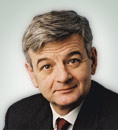The Economic Consequences of America’s Elections
STANFORD - November's mid-term elections were a sharp rebuke to the vast expansion of government spending, deficits, and debt in the United States. Elected in the midst of the financial crisis in the fall of 2008, President Barack Obama and the Democratic leadership of Congress seemed surprised when the public rejected their stimulus, health-care reform, and energy policies by large margins.
Of course, some of the huge increase in expenditure and debt has been the result of the recession, and of the defense and other spending legacies of President George W. Bush. But, instead of finding security and salvation from recession in a new era of dependence on government, most voters were repelled by such policies' apparent failure to do much to improve the economy.
Thus, the election results should not be viewed primarily as an endorsement of the Republicans, but as a rebuke to the Democrats' agenda, which voters believed was out of touch with their concerns, interests, and values.
The Republicans took control of the House of Representatives, netting more than 60 seats - the most in over 70 years - and six Senate seats. They gained in every part of the country, but especially in the industrial heartland from Pennsylvania to Wisconsin. They also won many governorships and took over many state legislatures; both will play a vital role in redrawing Congressional and legislative districts in the reapportionment next year following the 2010 census.
With divided government, many expect partisan gridlock on major legislation. But there is reason to be hopeful: the American economy, labor market, and stock market have historically fared a bit better in years of divided government.
Moreover, the changed Congressional landscape will be better for trade-related legislation. The Republicans' protectionist wing is smaller than the Democrats', which may eventually help free-trade agreements between the US and countries such as South Korea and Colombia, as well as a revival of the moribund Doha round of global trade-liberalization talks.
Likewise, economic (but not other) tensions between China and the US should be a little easier to manage. "Global rebalancing" requires surplus countries such as China to boost consumption, while deficit countries such as the US save more (which requires sharply lower budget deficits and increased private saving). It will get a more sympathetic hearing from the new Congress than from President Obama, who was soundly rebuked at the Second G-20 Summit for demanding more deficit-financed spending.
The new Congress will not support Obama's additional stimulus plans, such as a national infrastructure bank. Republicans will want to reform federal infrastructure spending - which is already substantial - rather than add to it. They are committed to rolling back spending to 2008 levels. In short, they want to ensure that the spending explosion is indeed temporary, not entrenched in a new baseline for the federal budget.
But Obama's veto power is a big obstacle to reversing his policies. While Republicans will be able to make some inroads on reducing spending and preventing tax hikes, making good on their vow to "repeal and replace" Obama's signature health-care reform would require a Republican to be elected as president in 2012.
A showdown also looms over tax policy. Obama's temporary first-year expensing proposal for capital purchases (a good idea as part of a permanent corporate-tax overhaul) could get folded into broader tax legislation. But the center of attention will be the expiring Bush tax cuts of 2001 and 2003, which reduced marginal tax rates on income, dividends, and capital gains.
Obama wants to let the cuts expire at the end of this year, but only for those with incomes over $250,000. Republicans will mount substantial pressure to extend the tax cuts for all, as well as to prevent expansion of the so-called alternative minimum tax (which applies if it is larger than the regular tax) from hitting millions more taxpayers. Indeed, the lower marginal rate ought to be made permanent, but accompanied by spending control, with broader tax reform to come later.
Another important feature of the new Congress will be heightened polarization. The center of gravity of the remaining Democrats has moved to the left, because the vast majority of defeated Democrats were moderates from swing districts. Likewise, the Republicans elected several conservative senators and a sizeable number of more conservative House members.
This will make compromise even more difficult, as will partisan positioning in the run-up to the 2012 presidential election. Meanwhile, most political analysts do not expect Obama to make as large a move to the political center as President Bill Clinton did when the Republicans took control of Congress after the 1994 mid-term elections. Clinton then worked with Republicans to balance the budget and reform welfare, easily winning re-election in 1996. But Obama starts much further left than Clinton, making a move to the middle a longer trek if he decides to embark on it.
That means that a period of legislative stalemate looms over many of the big issues. We are likely to see some spending consolidation, but less than in Great Britain and other European countries. Temporary extension of most or all of the Bush-era tax cuts is also likely. And trade liberalization may be an area where Obama and Congress can agree.
Inaction in other areas will be bad news for many. But America's lurch toward a European-style social-welfare state in Obama's first two years appears to have been halted, if not permanently ended or reversed. And that is good news for the US - and for the global economy.
Copyright: Project Syndicate, 2010.
www.project-syndicate.org
This article is brought to you by Project Syndicate that is a not for profit organization.
Project Syndicate brings original, engaging, and thought-provoking commentaries by esteemed leaders and thinkers from around the world to readers everywhere. By offering incisive perspectives on our changing world from those who are shaping its economics, politics, science, and culture, Project Syndicate has created an unrivalled venue for informed public debate. Please see: www.project-syndicate.org.
Should you want to support Project Syndicate you can do it by using the PayPal icon below. Your donation is paid to Project Syndicate in full after PayPal has deducted its transaction fee. Facts & Arts neither receives information about your donation nor a commission.





















